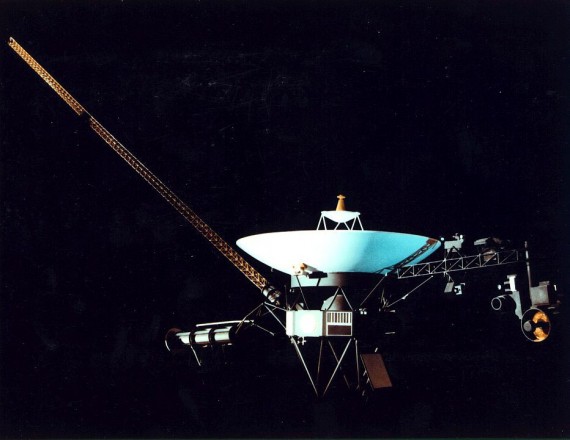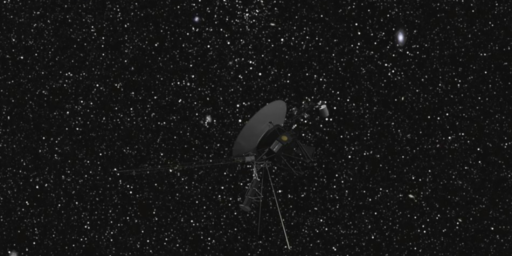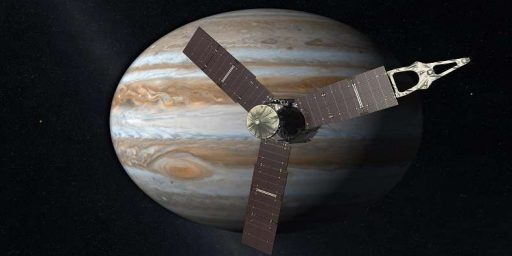Voyager I On The Verge Of Exiting The Solar System, Sort Of
The big science news of the week has been the announcement that the Voyager I spacecraft, launched on September 5, 1977, is on the verge of exiting the Solar System:
For nearly 35 years, NASA’s Voyager 1 probe has been hurtling toward the edge of the solar system, flying through the dark void on a mission unlike anything attempted before. One day, mission controllers hope, Voyager 1 will leave the solar system behind and enter the realm of the stars—interstellar space.
That day may be upon us.
“The latest data from Voyager 1 indicate that we are clearly in a new region where things are changing quickly,” says Ed Stone, Voyager project scientist at the California Institute of Technology in Pasadena. This is very exciting. We are approaching the solar system’s final frontier.”
The “frontier” he’s referring to is the edge of the heliosphere, a great magnetic bubble that surrounds the sun and planets. The heliosphere is the sun’s own magnetic field inflated to gargantuan proportions by the solar wind. Inside lies the solar system—“home.” Outside lies interstellar space, where no spacecraft has gone before.
A telltale sign of the frontier’s approach is the number of cosmic rays hitting Voyager 1. Cosmic rays are high energy particles such as protons and helium nuclei accelerated to near-light speed by distant supernovas and black holes. The heliosphere protects the solar system from these subatomic bullets, deflecting and slowing many of them before they can reach the inner planets.
As Voyager approaches the frontier, the number of cosmic rays has gone up.
“From January 2009 to January 2012, there had been a gradual increase of about 25 percent in the amount of galactic cosmic rays Voyager was encountering,” says Stone.
“More recently, however, we have seen a very rapid escalation in that part of the energy spectrum. Beginning on May 7, 2012, the cosmic ray hits have increased five percent in a week and nine percent in a month.”
The sharp increase means that Voyager 1 could be on the verge of a breakthrough 18 billion kilometers from Earth.
When Voyager 1 actually exits the heliosphere, researchers expect to see other changes as well. For one thing, energetic particles from the sun will become scarce as the spacecraft leaves the heliosphere behind. Also, the magnetic field around Voyager 1 will change direction from that of the sun’s magnetic field to that of the new and unexplored magnetism of interstellar space.
So far, neither of these things has happened. Nevertheless, the sudden increase incosmic rays suggests it might not be long.
It’s an amazing accomplishment, made all the more so by the fact that nobody really thought that Voyager would remain operational this long when the probe was first launched nearly 35 years ago. However, some at NASA are pointing out the fact that, technically, it will be many more thousands of years before Voyager I officially leaves the confines of our Solar System:
In that sense, it can be said that the spacecraft will be able to sample what space is like beyond our solar system. (If we define the solar system as the Sun and everything that primarily orbits the Sun, however, Voyager 1 will remain within the confines of the solar system until it emerges from the Oort cloud in another 14,000 to 28,000 years).
Voyager 2 isn’t far behind its sister ship, but neither are expected to last the thousands of years it will take to traverse the Oort Cloud in terms of being able to transmit data or make course corrections. Nonetheless, they will continue traveling, and Voyager 2 should be passing by the star Sirius in about 296,000 years.
Illustration via NASA






Wonderful stuff, but sadly, it does make the point of how our fantasies of inter-galactic travel are just that. We are never going to be able to leave our solar system, let alone our galaxy, and there aren’t really many places to even land in our solar system.
VGER lives!
I love that the little spacecraft that could is still chugging. Though what Tano said applies too (reversing galaxy and solar system obviously), unless and until we discover magic (FLT).
@Tano: Sure, with what we know today the idea of interstellar travel seems like a fantasy, but a little over a century ago people were saying the same thing about self-propelled flight, even mere weeks before it was accomplished.
With the current rate of advancement of our scientific and technological understanding, it would be nearly impossible for anyone today to even imagine what we’ll have achieved in another century.
????
The Oort cloud, what we here discuss as the limit of our solar system (i.e. the end of our driveway), is about one light year away. That means we would have to figure out how to propel ourselves at the speed of light, in order to get to the end of our driveway and back in a couple of years.
I fully appreciate the relentless and amazing march of technology, and that there are countless examples of us doing things that no one though possible, but still, there do seem to be some limits. I think I can say with some confidence that we will never approach movement near the speed of light – thus it will always take many years just to get to the edge of the solar system.
Beyond that, of course, there is nothing till Proxima Centauri which is well over 4 light years away, and no place to land, as far as we know. And that is only the first star….
Consider the economics of it all too….
@Tano: I agree that at this point in time our best science says it’s basically impossible, and there’s no rational incentive to even attempt it, but if we manage not to kill ourselves we’ve got 4-5 billion years to figure it out.
I certainly wouldn’t expect to see people zipping around the stars like Star Trek, but social, environmental, and economic pressures could change such that it becomes reasonable to attempt sending a colony to another star on a one-way trip in a vehicle designed to sustain a viable breeding population indefinitely, for example.
Unless it’s possible to exceed the speed of light, which current physics tells us is impossible, then the world of Star Trek is impossible to achieve regardless of how vast an energy source we’re able to tap.
@Tano: Using never in relation to scientific progress is a dangerous thing. I have no doubt we’ll be able to visit other systems in the future. The only question is how long will it take?
Do keep in mind our current understanding of physics is quite infantile in the grand scheme of things. We’re nearly constantly re-adjusting our math based on observations. As we advance we might discover something like dark matter is just a mathematical error on our part.
We’re already teleporting particles in the lab. Quantum mechanics was something that Einstein himself decried as hocus pocus. “god doesn’t play dice with the universe”. Yet we’re currently using quantum mechanics in mundane things such as transistors.
The laser in your DVD drive was spawned from quantum mechanics which was an academic curiosity with “no applications possible” merely 60 years ago. Quantum computing is almost within our grasp already.
A science that was considered “nuts” and “impossible” 60ish years ago is now providing very real and useful technology.
Nobody questions the fact that our world is filled with amazing technological accomplishments that everyone thought impossible just a few years ago.
It would be an absurd logical fallacy to conclude from that that there are no limits whatsoever to what we can accomplish.
I need no convincing of the fact that we will figure things out in the future that seem impossible today. But I do not think we will ever come close to moving at the speed of light. We will always be restricted to a very small little circle around our solar system. I think that is simply the nature of the universe and our place in it.
At the end of the day, it comes down to simple scientific realities. I can enjoy science fiction as well as anyone, but I have never seen any realistic description of how to actually, in the real world, achieve such speeds, or how to sustain life for the time periods needed, nor how or why we would finance an attempt to reach such goals.
And, quite frankly, other than for the thrill of doing something never done before, there really does not seem to be any place to go to, no practical reason to send a mission out of our solar system.
@Tano: I never once claimed there were no limits. I’m claiming that you’re incapable of seeing the real limits because of the primitive state of our technology. Your insistence on saying that the speed of light is a limiting factor clearly shows your lack of imagination and even knowledge.
We’ve already teleported a particle in the lab and we’ve done experiments that prove we can move information instantaneously. Both of those feats were thought impossible by Einstein. You know the guy that made the basis of the whole faster then light dogma that you’re clinging to desperately.
This clearly sums up your complete lack of imagination or vision.
Stuff is hard so we shouldn’t bother with it. Boy I’m glad that not everyone is like you or we’d still be living in caves…
Hmmm. So you accept that there are most likely limits, but you don’t accept the ones I propose. How does that make me lacking in imagination? We both accept that there are many amazing things that we will do, and we both accept that there are limits to what we will ever do. Our only argument is over where the line is.
But you have some need to reframe the argument as some comic-book version of a “visionary-luddite” dispute, complete with absurd mischaracterizations of what I said. Why do you have a compulsion to drive the two of us to opposite extremes?
Maybe you should get serious and run the numbers. Where would you like to go outside of our solar system? What would you imagine could be done once we got there? How far away is that place? What would be your propulsion system? How would you support life? How would you communicate back to earth. Just because we have the ability to imagine many totally impractical ways that this could be done (i.e. science fiction), does not mean it can be done.
Yes, there really are physical limits, and I don’t think you are entitled to any cred as a visionary because you merely deny that there are limits for the things you would like to do. A real visionary is not one who just insists on living in a dream world, but one who solves actual problems. I think that a perpetual motion machine would be way cool too, but I fear that that too is impossible. Is that another example of a lack of vision?
@Tano: I’m obviously more serious about this subject then you’ve ever been. You’re either not reading my posts or you simply don’t understand the current state of high end physics. The answers are there but you’re refusing to read them.
@matt:
Where is that, matt? I don’t see any answers here, just vague assertions. Please, educate us, oh serious person.
How much energy do you understand would be necessary to transport people or objects beyond the speed of light? How do you imagine, with your great imagination, harnessing such energy?
And seriously, where would you like to go, and what would you do there? Are you just interested in inter=galactic tourism?
Earth-life has evolved by adapting to a very special environment – requiring things like oxygen and water that are simply not present in the necessary concentrations almost anywhere in the universe – actually no where that we know about. There are no “greener pastures” out there, almost by definition, since we are fine-tuned to survival in this particular environment.
Vague assertions? I told you specifically we’ve been able to transmit information instantly via quantum mechanics and then the next post you ask “HOW WILL WE COMMUNICATE WITH OUR COLONIES!!!”.
Then…
After I told you about how we’ve teleported particles in the lab. I also told you how technology like lasers and transistors went from “impossible” to used in everyday electronics in a matter of years (albeit decades in the case of lasers). Yet for some reason you cannot make the connection that the teleportation of matter might somehow possibly be useful for transportation across long distances.
I won’t be going anywhere but if we as a race intend to survive we’ll need further resources. Also in 4 or 5 billion years our sun will supernova so we’ll either have to figure out how to refuel it or move to a new home planet.
Of course you know this because a thousand year old book told you this? Seriously I must be getting trolled because I cannot fathom how someone would make such an arrogant statement when the possibilities are endless for finding another earth. We’re already finding planets that are possibly like earth and we cannot even see most of our galaxy let alone any of the potentially near infinite number of other galaxies floating around. The numbers are well in our favor that there is another earth level planet out there. Just finding it will be difficult till the proper technology is developed.
Do you even have the capability of realizing what 4 billion years is like? Do you not realize that your lifetime isn’t even a fraction of a second in geologic terms?
Or am I getting trolled by a bible thumper?
Sorry matt, I misunderstood you. I didn’t realize that you thought this was a practical thing. Maybe you can start here: (or rewrite it with your deeper knowledge)
For some reason I cannot go along with the notion that because we have done some things that were once widely considered impossible, therefore we must eventually accomplish everything that we now believe to be impossible???
Yes, that is true. But the fact that our Earth is doomed, and that we will need another place to go, does not mean that we will find such a place, or be able to go there if we did find it.
huh? Darwin didn’t write a thousand years ago. I don’t know what on earth you are referring to. As I said, we are finely adapted to this particular environment, and any significantly different environment would require a constant huge expenditure of energy to maintain an earth-like bubble around us.
You seem to be more in tune with the bible thumpers here, because you are the one who seems desperate to believe in fantastical other worlds that are accessible to us. You are simply not taking the science seriously. I guess as long as you can fantasize about taking the wormhole to Earth II, then it must be possible, is that how it works?
@Tano: I’m not suggesting that we’ll ever learn to break the light speed barrier. Traveling faster than light is impossible as far as we know, it will likely remain so. However, there is no reason you can’t travel at very high fractions of light speed, provided you have enough energy.
If one is willing to commit decades, or centuries and generations, on a one way trip to another star, it becomes merely a technologically difficult and incredibly expensive engineering challenge. Both of those factors can change.
“Never” is a very, very long time.
Apparently you haven’t been paying attention to the experiments going on with quantum entanglement and quantum correlations. The current research indicates that entangled photons can be used to create a secure line of communication that is currently impossible to hack and instant. Naturally it’ll take more research to enable complex messages to be sent but the basic footwork has been done and proven viable.
You continue to amaze me with your blatant disregard for what I actually typed. Your insistence on creating a strawman that never existed is indicative of your inability to accurately challenge the statements I have posted. I have clearly stated that we are in no position to declare what is impossible or possible as our level of science is extremely primitive. The whole of humanity’s history doesn’t even add up to a microsecond in geologic terms. We have another 4 or so BILLION years to figure some of this stuff out…
Nor do the primitive tools we use today indicate that we’ll still be using primitive tools in 4 BILLIOn years..
You’re exhibiting classic bible thumper behavior with your “I KNOW EVERYTHING AND HOW IT”LL BE” and your outright refusal to actually respond to what I really wrote instead of what you wish I wrote.
All my statements are grounded in facts and the current science. If you could actually be bothered to read and respond to what I’m typing instead of making up crap as we go I’d appreciate it.
I feel like I’m trying to converse with a brick wall. Scientific advancement isn’t about starting with all the answers and merely focusing on trying to do something with it. Scientific advancement is about asking questions and then trying to find the answers. So of course I have no idea how we’d create a wormhole or if it’s even possible to do so with the current laws of the universe. What I do know is that I have presented you with plenty of examples of how research into “crackpot” and “impossible” theories have produced results that we utilize daily in our home appliances. That the natural advancement of the sciences has produced results that would be considered magic a few hundred years ago (or in some cases decades). When you’re dealing with a galactic timeline of at least a billion or more years there’s a LOT of time for your to pull off “magic”.
Naturally this is all subject to being thrown out the window if one of the weirder theories like the M-theory ends up being true.
To clarify those that were declaring “crackpot” and “impossible” were the great minds of the time including Einstein the guy who’s research you’re falling back on..